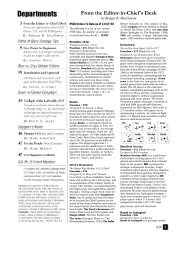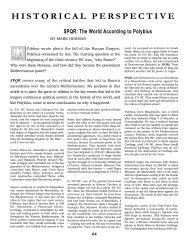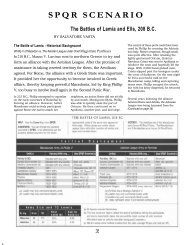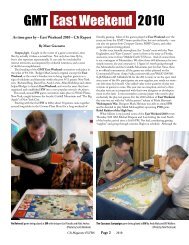PYRRHUS OF EPIRUS vs. ROME - C3i Ops Center
PYRRHUS OF EPIRUS vs. ROME - C3i Ops Center
PYRRHUS OF EPIRUS vs. ROME - C3i Ops Center
You also want an ePaper? Increase the reach of your titles
YUMPU automatically turns print PDFs into web optimized ePapers that Google loves.
P Y R R H U S <strong>OF</strong> E P I R U S v s . R O M E<br />
Claiming Your Own Pyrrhic Victory<br />
BY MIKE REED<br />
An in-depth look into the Army of History's Greatest Soldier of Fortune<br />
The Epirote King / Soldier of Fortune Pyrrhus had the misfortune<br />
to be at his zenith at a time when Rome was emerging as an ancient<br />
superpower. His battles with the Romans, while not spectacular in<br />
regards to the Art of War, added the term Pyrrhic Victory indelibly to<br />
our vocabulary. One uneducated in antiquity would be prone to<br />
dismiss him as a bumbling fool, but would be gravely mistaken.<br />
Pyrrhus was regarded as one of the finest soldiers of his time, by<br />
both friend and foe, even aspiring to that mythical title Great Captain.<br />
But what do we see when it comes time to field an army for the<br />
GBoH Great Captains tourney? Plenty of would-be Hannibals,<br />
Scipios, Alexanders, and Caesars, but not even one Pyrrhus! This is<br />
sad, for it denies us the opportunity to see how a fine-tuned<br />
Hellenistic style Greek army can stand up toe-to-toe with all the<br />
pretty-boy armies of the day. Perhaps the reason Pyrrhus was so<br />
respected by his contemporaries was that he achieved so much with<br />
the materials he had at hand. No other general of the day, save<br />
perhaps Hannibal, can make that claim. Perhaps a closer view of<br />
what GBoH offers with regards to Pyrrhus' armies will further<br />
enlighten the reader.<br />
Pyrrhus' three major battles with the<br />
emerging Roman Republic are all covered<br />
in SPQR, and its module, entitled Pyrrhic<br />
Victory. In chronological order, they are<br />
Heraclea (280 B.C.), Ausculum (279 B.C.),<br />
and Beneventum (275 B.C.) All three are<br />
set in drastically different environs:<br />
Heraclea on the traditional flat open map,<br />
albeit with a stream in the middle.<br />
Ausculum over two days in a rough<br />
stream/rocky area.<br />
Beneventum, in which the Roman Camp<br />
is central to the battle.<br />
Through these battles you get a good<br />
appreciation of the Roman <strong>vs</strong>. Macedonian<br />
military systems over three different styles<br />
of terrain. In the following paragraphs, I<br />
will attempt to describe Pyrrhus' army, its<br />
strengths and weaknesses; and how best to<br />
attempt to defeat the Romans in the above<br />
mentioned three<br />
17<br />
battles. And remember, every victory you<br />
win will be a Pyrrhic Victory. Just what that<br />
term will mean will be up to you .<br />
Pyrrhus' Army<br />
The army of Pyrrhus is not in the Epirote<br />
battle plan's chance of success. They cannot<br />
be thrown away, yet they cannot be trusted.<br />
Cavalry<br />
This is one area where the Epirote army<br />
outclasses all others in<br />
the SPQR pantheon.<br />
High TQ, Heavy and<br />
Light Cavalry both<br />
outnumber and outclass their Roman foe.<br />
Only the Carthaginian, when in possession<br />
of his Numidian allies, can match this. As<br />
the Epirote cavalry goes, so<br />
shall the battle. Every attempt must be<br />
made to gain and keep the initiative with<br />
this force.<br />
Elephants<br />
This is Pyrrhus' secret weapon versus<br />
the Romans. From the first<br />
encounter with these beasts in<br />
Heraclea, where the Romans<br />
soiled their armor at the sight<br />
of such a behemoth, to Ausculum and<br />
Beneventum, where the countermeasures<br />
existed of ludicrous ox carts and flaming<br />
tarred pigs (!), the Roman collective<br />
consciousness is focused on these animals.<br />
No other playing pieces you possess will<br />
provide so much psychological impact for<br />
such little actual effect. Learning how to<br />
maximize this advantage for use at the<br />
crucial moment of the battle will be a main<br />
goal of your use of the Epirotes in battle.<br />
Leadership<br />
Here, only the Roman Military System<br />
itself can help match your<br />
outstanding battlefield leadership.<br />
The obvious advantages of<br />
an Elite leader need no<br />
discussion here. What is important to note<br />
is that the majority of your leaders outclass<br />
even the best of what the Romans have to<br />
offer. This means that once battle is joined<br />
and the lines are confused, your leadership<br />
(initiative) advantage can be put to its best<br />
use. Tribunes and Praefects
are at their most efficient while parading<br />
the lines about in preparation for battle.<br />
Once you can break the lines up, they will<br />
be no match for you.<br />
General Tactics<br />
As 1 have alluded to above, the Roman's<br />
greatest strength is their military system.<br />
When the Roman is allowed to deploy his<br />
lines freely and attack as such, he may be<br />
near unstoppable. The corollary to this is<br />
that if the opportunity to do this is<br />
denied, he will be defeated. This destruction<br />
of the system should be the main<br />
focus of your battle plan. Attacks should<br />
be made to cut off and isolate pockets of<br />
lines that will render line commands<br />
useless. That is when Initiative level 2<br />
and 3 Praefects and Tribunes will become<br />
nearly impotent. Your initiative 4 and 5<br />
leaders, with their greater command<br />
ranges, will tilt the scales in your favor.<br />
What is important here, though, is that<br />
you do not lose too much in the process of<br />
breaking the lines up. Medium Infantry is<br />
much better on the attack versus legionary<br />
troops than when they stand and<br />
receive (just check the charts for what I<br />
mean here). This is a task they are well<br />
suited for. Utilize them to disrupt the<br />
Roman lines while the Epirote Cavalry<br />
goes to work.<br />
The Epirote Cavalry must have as its first<br />
objective the neutralization of the Roman<br />
cavalry arm. Once this task is done, they<br />
will be able to act with impunity on the<br />
flanks and rear of the Roman force. It will<br />
probably be imperative to utilize Pyrrhus<br />
and one other high initiative leader to<br />
achieve this.<br />
Once the Roman cavalry has prevailed,<br />
and the Roman front lines are broken up.<br />
it is time to administer the coup de grace.<br />
Press forward with the Phalanxes to pin<br />
the Romans in place, while the cavalry<br />
attacks the flanks. The Elephant corps is<br />
then unleashed, causing much more<br />
havoc to the Romans than the Epirotes<br />
(hopefully). During this havoc, taking<br />
advantage of the situation with Pyrrhus<br />
himself may spell victory. It will be,<br />
however, as the Duke of Wellington<br />
remarked after Waterloo, a near run thing.<br />
Nothing in GBoH is definite. This plan is<br />
only as good as the execution and the<br />
fortunes of war allow. Having a coherent<br />
battle plan in your mind before the battle,<br />
however, is essential to victory. Pyrrhus'<br />
army will not win without careful<br />
planning.<br />
and cut them up with no rout paths. This<br />
will limit your loss to pursuit, and<br />
prepare you to fall upon that now open<br />
flank with the bulk of your force.<br />
It is very important that you time your<br />
release of the Elephant corps properly.<br />
Use them too soon, when the Romans are<br />
for the most part unengaged, and you will<br />
not reap the benefits of the disorder you<br />
cause. It is best to spring them on the<br />
Roman left as you descend upon his flank<br />
with the cavalry and push forward with<br />
your phalanx line. This will allow<br />
maximum effect for minimum effort.<br />
They cause the Roman cavalry to spaz out<br />
by merely coming within OW range!<br />
Don't allow the elephants to be engaged,<br />
after their first combat (no TQ check),<br />
however. If they rout, their entire effect<br />
on the battle shall be lost (as well as<br />
possibly squishing some of your own<br />
troops in the process).<br />
The Megacles switcheroo rule allows you to<br />
be a little more risk-taking than you<br />
normally would be with your OC. This is<br />
not a license to throw the Pyrrhus counter<br />
away, however, but is helpful to keep in<br />
The Battles<br />
Heraclea, 280 B.C.<br />
This battle is, in my opinion, the closest<br />
fought match in the entire SPQR/ GBoH<br />
set of offerings. It is a straight up fight<br />
between the two forces, and is a good<br />
starting point to learn the system for an<br />
inexperienced player, even more so than<br />
the teaching scenario in the SPQR box. The<br />
Epirote's first effort in this battle is to<br />
stave off the attack from Drusus' right<br />
wing cavalry. A bit of on the spot<br />
leadership by Pyrrhus himself should do<br />
the trick. These Romans, unless unusually<br />
lucky, will be cut off and out on a<br />
limb after the first phase. Ruthlessly hit<br />
them in the flanks with your light cavalry<br />
18
Analysis of Pyrrhus's Epirote Army in SPQR<br />
mind as an additional weapon if needed.<br />
The army fielded in Heraclea will be the<br />
best that you will ever have. Enjoy it, for<br />
your job will only become harder in the<br />
future. It is, however, a good historical<br />
look at what an Alexander in Italy scenario<br />
could be, without resorting to historical<br />
fiction.<br />
Ausculum, 279 B.C.<br />
This is probably one of the hardest battles<br />
on which to formulate a plan. In fact, it<br />
practically precludes one. The best<br />
advice I can offer here is that you must<br />
utilize your cavalry and light infantry<br />
arm to their best ability to disrupt the<br />
Roman's efforts in deploying his army in<br />
optimum (i.e. three-line) formation.<br />
Remember, as I stated above, breaking<br />
up the Roman lines will go a long way<br />
towards victory. Doing this at the<br />
cheapest cost should be your aim here.<br />
Getting your Phalanx line deployed<br />
favorably should also be of great<br />
import. There is so much opportunity for<br />
variation in this battle, that it defies<br />
close study. As Pyrrhus, however, I<br />
would tend to avoid the set-piece battle,<br />
as the Romans are then deployed to their<br />
maximum advantage.<br />
The elephant corps will have less impact<br />
here than at Heraclea. It is quite amusing,<br />
however, to see the pathetic little oxcarts<br />
in action!<br />
Beneventum, 275 B.C.<br />
One of your goals in this battle will be to<br />
get your own army deployed from march<br />
column, and reorganized prior to the<br />
Roman getting his own act together. This<br />
is no easy task. I would highly recommend<br />
using the extended night march, to better<br />
get your Phalanx on line in the middle of<br />
the flat open plain. Under no<br />
circumstances should you allow your<br />
troops to violate the night/ dusk alert lines!<br />
To do so will leave you hopelessly strung<br />
out and lose you the battle before it is<br />
joined. The first turn should be spent in<br />
reorganizing — removing cohesion hits from<br />
those units that suffered fatigue<br />
from the night march. You did<br />
remember to stay out of Scorpio<br />
range didn't you? After this<br />
primary task is completed, it is<br />
time to harass the Roman debouchment from<br />
the camp with the cavalry and light infantry.<br />
Don't let your elephants close to the camp,<br />
lest they get shot to pieces by the Scorpio! It<br />
may be prudent to fall upon a Roman<br />
detachment in force once it has stepped<br />
outside the gate, but before it can deploy<br />
into line. Run off any Roman cavalry<br />
foolhardy enough to challenge your cavalry<br />
in the open ground.<br />
At some time in the battle, you must decide<br />
whether it is prudent to attempt an assault<br />
on the camp. This may be necessary, as the<br />
Roman is hardly going to oblige you<br />
cutting him to pieces while he attempts to<br />
debouch from camp. There are no killer<br />
troops such as Alexander's Companions,<br />
Hannibal's Veterans, or Scipio's crack I<br />
Legio. On the contrary, the bulk of this army<br />
is of moderate TQ. Pyrrhus has two trump<br />
cards versus the Romans, however: his<br />
elephants, and his outstanding leadership.<br />
Let us first look at the rank and file,<br />
however, so that we understand better what<br />
clay this army is made of.<br />
EpiroteInfantry<br />
The Epirote infantry is of two types:<br />
Macedonian Phalanx and allied troops.<br />
The former are of the same pedigree as<br />
Alexander's veterans. They have 7 T and<br />
will stand up (frontally) to anything the<br />
Romans throw at it. They are here, as in<br />
Alexander's army, the anvil upon which<br />
victory is forged. The supporting troops,<br />
however, leave much to be desired. A<br />
polyglot mixture of mediocre TQ<br />
Medium Infantry, their best use is to be<br />
hurled at the Roman lines in an<br />
19<br />
attempt to tie up and disrupt them long<br />
enough for the cavalry and elephant corps<br />
to carry the day. How well this is done is<br />
a key element — caution here — Phalanxes<br />
were not meant to accomplish this task! If<br />
you have not inflicted any significant<br />
damage on the Roman during his deployment,<br />
it may be better for you to have him<br />
come to you on the plain outside his camp<br />
rather than you trying to break in. Trying<br />
to break in against a well-deployed force<br />
anchored on the camp is suicide.<br />
Conclusions<br />
There you have, in a nutshell, my<br />
thoughts concerning the Epirote Army in<br />
SPQR. After using these troops enough,<br />
you can earn a real appreciation of why<br />
Pyrrhus was considered so highly among<br />
soldiers of his day, and how inappropriate<br />
his legacy to the Military Art has been.<br />
It is an easy task to win with well trained<br />
troops. It takes a far better leader to<br />
accomplish great tasks with little.<br />
Hannibal of Carthage has long been<br />
acknowledged as a master here. Pyrrhus<br />
of Epirus should be as well. I can offer no<br />
better confidence in this than by stating<br />
if I ever get to a GBoH Great Captains<br />
Tournament, there will finally be at least<br />
one Pyrrhic Army on the field of battle.<br />
Care to join me?

















